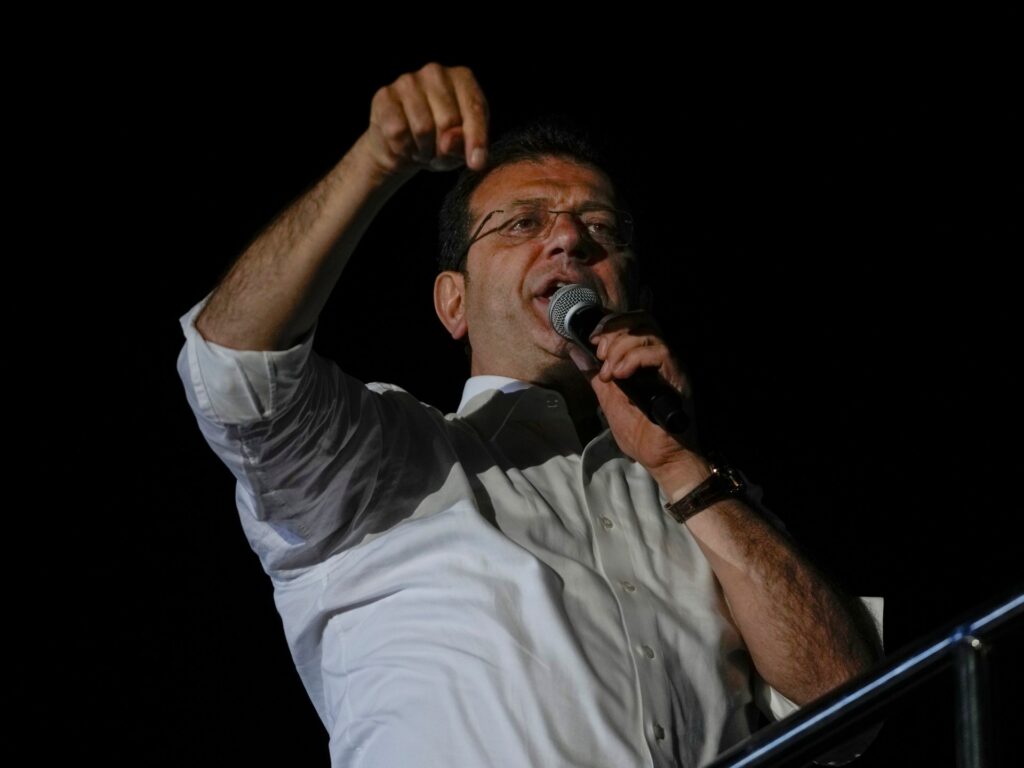Turkey’s opposition has scored a landslide victory over President Recep Tayyip Erdoğan and his Justice and Development Party (AK Party) in local elections, with the main opposition Republican People’s Party (CHP) winning major cities in Istanbul, Ankara and Izmir. Ta.
According to Daily Sabah, the final tally after Sunday’s voting showed the CHP with 37.8% of the vote, followed by the AK Party with just under 35.5%.
Istanbul’s CHP mayor Ekrem İmamoğlu retained the city, defeating AK Party candidate and former Environment and Urbanization Minister Murat Krum with just over 51 percent of the vote. Mr Erdogan, 70, was born and raised in Istanbul and served as its mayor in the 1990s, so the defeat was seen as a personal blow.
Who is Ekrem Imamoğlu?
Imamoglu, 53, was elected mayor of Istanbul, Turkey’s economic capital and largest city with 16 million people, in 2019, ending 25 years of rule by the AK Party and its conservative predecessors. hit.
Mr. İmamoğlu’s career mirrors that of Mr. Erdoğan, and both began their political careers in Istanbul in the 1990s, but were hampered by legal problems.
İmamoğlu hails from the secularist CHP, which he joined in 2008 and became mayor of Istanbul’s Beylikduz district 10 years ago.
He studied business administration at Istanbul University, graduating in 1994 when Erdogan became mayor, and then worked in his family’s construction business.
Mr. Erdogan entered politics as a member of the Islamic Welfare Party, co-founded the AK Party in 2001, and took over as prime minister at the end of 2002.
In 2022, Imamoglu was sentenced to two years and seven months in prison for insulting Turkey’s Supreme Electoral Council and banned from political activity. He has appealed, but the appeals court has not yet issued a ruling.
The accusations stem from Imamoğlu’s first victory as mayor. The Justice and Development Party complained of “fraud” and was forced to rerun the election. İmamoğlu, who was elected for the second time, described the cancellation of the first round as a “stupid act”.
The mayor denied that he had insulted the election commission with his comments, which he said were a response to Interior Minister Suleyman Soylu, who had called Imamoglu a “fool” and accused him of criticising Turkey.
Imamoglu was seen as a likely challenger to Erdogan in the 2023 presidential election but did not run, with Erdogan winning with 52 percent of the vote over CHP rival Kemal Kilicdaroglu.
Where did the CHP declare victory?
CHP candidates won in 35 of Turkey’s 81 provinces, including Antalya, Denizli and Izmir.
In addition to İmamoğlu’s victory declared in Istanbul, CHP mayor Mansur Yavas also defended the capital Ankara, defeating his opponent, veteran politician Turgut Altinok, with just over 60 percent of the vote.
Are the results surprising?
In the May 2023 presidential election, the opposition fought to oust President Erdoğan and his AK Party. The CHP had hoped to get a chance to take on Erdogan in the wake of the country’s economic turmoil and the aftermath of the devastating February 2023 earthquake in southern Turkey.
That effort failed, dealing a blow to the CHP and the opposition, as Erdogan won another five-year presidential term and the Justice and Development Party (AKP)-led coalition won a majority in parliament.
After last year’s elections, the nationalist IYI (Good) party split from the CHP, and the Kurdish-dominated party (now renamed the DEM party) fielded its own candidates to challenge the CHP in local elections. In 2019, it didn’t.
Opinion polls before Sunday’s vote showed that the AK Party would do well, but that was not the case.
How did the opposition maintain its advantage?
Dissatisfaction is rising in Turkey due to economic decline, resulting in inflation rising to nearly 70 percent and rising costs of living.
Analysts have speculated that the AK Party’s weaker than expected performance was due to the economic situation and Imamoglu’s appeal beyond the CHP’s secular base in Istanbul.
“The economy is probably the biggest issue in this election,” said Behbi Baysan, an assistant professor at Istanbul’s Ibn Khaldun University.
What was your reaction?
In Istanbul, opposition supporters celebrated the victory by lighting torches and waving flags.
An Istanbul voter told Al Jazeera’s Sinem Koseoglu: He is fair and treats everyone equally. He prevented corruption. He is using Istanbul’s money for Istanbul. ”
However, supporters of the AK candidate were unhappy that Kurm was backing them.
How did President Erdogan react?
Speaking from the balcony of the presidential palace, Erdogan said his party had suffered a “low fall” across Turkey and that the people had delivered a “message”.
“Unfortunately, nine months after our victory in the May 28 elections, the test of local elections did not give us the desired results,” Erdoğan added. “We will correct our mistakes and make up for our shortcomings.”
He pledged to press ahead with economic programs introduced last year aimed at combating inflation.
What will happen next?
Some observers predicted that Mr. İmamoğlu would succeed Mr. Erdoğan in the local elections and gain the support he needs to rise from mayor of Istanbul to president of Turkey in the 2028 campaign.
President Erdoğan has indicated that he does not intend to run for a fourth term in 2028, nor is he eligible to do so, according to the current constitution.
However, Ahmet Qasim Khan, a political science professor at Beykoz University in Istanbul, said this ahead of the local elections. “If Murad Krum loses and Ekrem İmamoğlu wins, Erdoğan will be forced to run for office himself in 2028 without having to go through the trouble of choosing an alternative.”
If parliament calls for early elections or a constitutional amendment is passed, Erdogan could run for re-election, Mehmet Çelik, editorial coordinator of the Daily Sabah newspaper, explained in Al Jazeera’s Inside Story on Sunday.
Han hypothesized that a hypothetical snap election would be held “very close to 2028.”



